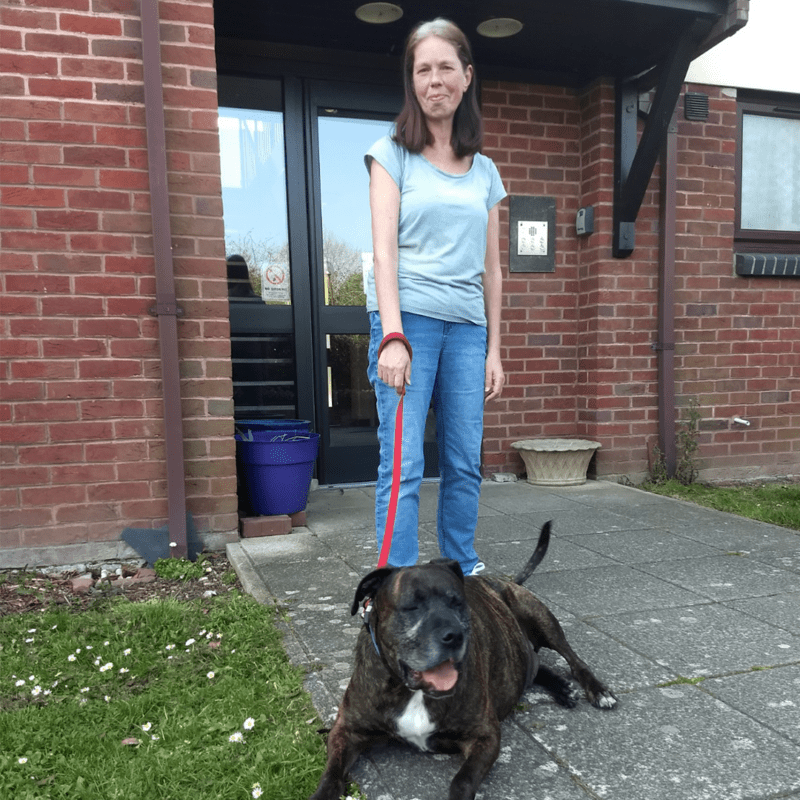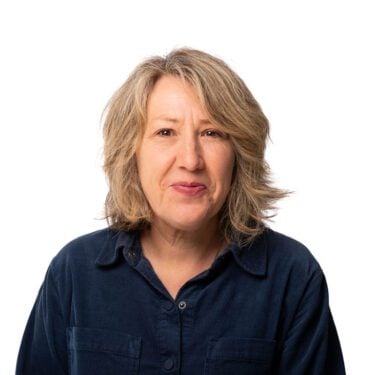Julie Cherry explains why involving people who are affected in musculoskeletal (MSK) research is crucial
Our latest call for applications to the Oliver Bird Fund (OBF), in partnership with Versus Arthritis, is looking to fund research to inform the ability of people with MSK conditions such as osteoarthritis (OA) and rheumatoid arthritis, to live well.
OBF programme lead Catherine Dennison, spoke to Julie Cherry, advisor to the OBF-funded RaMIgO project, about the significant challenges of living with physical health conditions and chronic pain and why she commits time to be involved in research.
Crucially, Julie points to how researchers can work in partnership with volunteers like herself.
How MSK conditions affect life at work and home
Julie’s developing health problems impacted her career in administration. Developing Graves’ disease, an immune system disorder, in her late 40s brought with it a wide range of problematic symptoms, which resulted in a thyroid storm. Although her role as a temporary ‘bank’ secretary provided flexibility, it offered little support or employment protection when her health worsened.
Julie is pleased to have her own place, sharing it with her much-loved dog, a Staffie-Mastiff cross called Jack. She manages her continuing immune condition with medication but began to develop OA and osteoporosis approximately 4 years ago, osteoporosis is associated with Graves’ disease. Julie and her neighbour offer mutual support, “I walk to the village to get her paper and she buys tins of dog food online so I don’t have to carry anything too heavy.”
Increasingly, however, the worsening of her OA makes her fear for the future in her second-floor flat. The building is not fitted with a lift, and her flat doesn’t have a walk-in shower. “There will come a time when I can’t do it and I’d hate to have to move,” Julie confides. Her flat in the outskirts of Bournemouth is surrounded by greenery, she enjoys good relationships with her neighbours and can conveniently access local amenities by bus.
The impact on managing finances
Julie enjoys her work as a Safety Steward, particularly valuing the income and friendships it brings. However, having a seasonal zero-hours contract means she needs to claim Universal Credit when she’s not working. Her experiences with the benefit system have been mixed: while support with rent and the provision of a laptop during the pandemic were welcome, being told ‘you need to get a cleaning job’ was not so helpful.
Julie describes how accepting work disadvantages her financially, for example removing entitlement to free prescriptions and council tax exemption.
She diligently budgets to cover her bills but repaying council tax arrears impacts her monthly income. Qualifying for personal independence payments (PIP) would enable Julie to buy healthier food, shoes that are easier to put on, a slip-resistant mat to shower and to install a rail in the bath. However, as she can still manage tasks such as cooking and showering, she doesn’t meet the required number of points, and the housing association won’t modify her home without requests from her GP.
The Influence of MSK conditions on wider well-being
In her twenties, Julie competed in county-level badminton. Now, constant backaches and a fear of further bone damage limit her being physically active. She is frustrated knowing that exercise would be good for her. Likewise, she would want to eat a healthier diet, but the cost-of-living crisis means she prioritises her dog Jack and eats cheaper, less nutritious food. Julie tracks good and bad days by keeping a diary, and supportive friends help her stay positive.

Getting involved in research
Julie is committed to supporting both MSK and broader research. She explains “If I can help one more person living with OA.”
She enjoys brainstorming and contributing ideas. As an active member of the RaMIgO project’s Patient and Public Involvement (PPI) group, she plays a crucial role in supporting the development of the intervention. The project focuses on adapting a peer mentor programme for remote delivery. She notes, “I never get to see my doctor any more so the premise of one-to-one support was attractive, and I like that it’s outside the NHS.”
Most substantially she is involved with Bournemouth University’s Public Involvement in Education and Research (PIER) partnership, bringing her experience of health services to assist student training. Julie co-facilitates Master’s courses, and when we speak is finishing marking assignments.
Lessons for researchers
From her research involvement, Julie has witnessed poor, ‘extractive’ practices, and values teams that give her regular updates. Speaking positively about one project, Julie notes, “We have two meetings a year, and then I get minutes in between”.
Check-ins during meetings are also helpful to ensure that things are going well. Clear information on financial compensation from the start aids her budgeting. Although her benefit payments are adjusted to take account of payments for involvement in research, Julie finds ‘being able to put something back’ is much more rewarding. Attending meetings also helps to keep Julie’s mind active.
Applying to the Oliver Bird Fund
Our Oliver Bird Fund welcomes proposals exploring how MSK conditions relate to social and economic well-being, aiming to inform policy and practice. Applications might consider how support from employers, housing, social networks, the benefits system and public services could better enable individuals to manage their conditions and engage in meaningful activities. We’re particularly interested in understanding differences in experiences according to income, occupation, ethnicity, gender and geography, to inform efforts to tackle inequalities. Applicants must ‘propose how they will meaningfully involve people living with, affected by, or at risk of, musculoskeletal conditions, and those supporting them, across their proposed project’.
Alongside academics and policymakers, people with MSK conditions will be involved in our assessment of funding applications. We will consider the importance of the proposed research question, rigour of the methods, plans for involving those with lived experience, and routes to impact.
About the authors
Catherine Dennison
Catherine contributes to the development and management of the grants portfolio. She leads our digital society grants and manages our Oliver Bird programme of research relating to the impact of musculoskeletal conditions on wider well-being.
Juile Cherry
Julie joined the PIER (Public Involvement in Education and Research) and PPI (Patient and Public Involvement) programmes approximately 5 years ago. Initially, it was only through Bournemouth University but since the introduction of Voice, a digital platform that enables PPI members to become more involved with research projects from all over the country, Julie has expanded her involvement.






















































